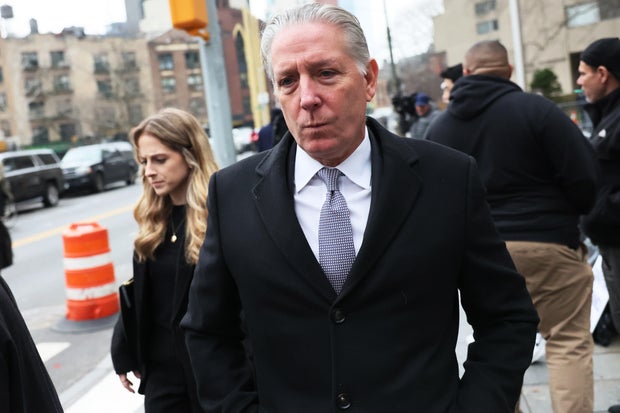Washington — Charles McGonigal, the former top counterintelligence official at the FBI’s New York office, is set to be sentenced Friday for concealing at least $225,000 in cash he received from a former Albanian intelligence officer.
McGonigal pleaded guilty in September to one count of hiding from the FBI the payments he got from a former employee of Albania’s intelligence agency who had moved to New Jersey.
Michael M Santiago / Getty Images
In exchange for his guilty plea, charges relating to McGonigal’s failure to disclose his overseas travel to meet with foreign government officials and businesspeople while employed by the FBI were dropped.
The government is seeking a 30-month prison sentence and $95,000 fine. McGonigal’s lawyer asked for a sentence of one to seven months that would run concurrently with his other prison term.
In December, McGonigal was sentenced in New York to more than four years in prison for his work for a sanctioned Russian oligarch and close ally of Russian President Vladimir Putin.
The charges in both cases marked a stunning downfall for someone who once held one of the FBI’s top counterintelligence posts.
Prosecutors in Washington argued that McGonigal’s actions “suggest he was compromised” and employment after his retirement from the FBI “was not his only motivation.”
The FBI was also forced to review numerous investigations that he had knowledge of to determine whether they had been compromised, according to prosecutors.
“The defendant worked on some of the most sensitive and significant matters handled by the FBI,” prosecutors said in a sentencing memorandum. “His lack of credibility, as revealed by his conduct underlying his offense of conviction, could jeopardize them all. The resulting internal review has been a large undertaking, requiring an unnecessary expenditure of substantial governmental resources.”
McGonigal’s lawyer said in court documents that his omissions were “done to conceal the fact that Mr. McGonigal had prematurely launched his business networking plan, including by obtaining a $225,000 loan, in the months before he retired from the FBI.”
The start of McGonigal’s troubles
McGonigal spent more than two decades at the FBI, working on some of the top national security cases, from stopping a plot to bomb the New York City subway to WikiLeaks’ release of a trove of classified documents. He rose through the ranks to become its counterintelligence chief in New York before retiring in 2018.
McGonigal’s fall from grace began in 2017 as he prepared for retirement, according to court documents.
McGonigal asked the former Albanian intelligence officer, who had become a naturalized U.S. citizen, for a loan as they discussed business opportunities. The loan was never repaid. The two traveled to Albania and other countries where the individual had business interests and met with foreign nationals on multiple occasions.
On one of those trips, McGonigal met with the prime minister of Albania to warn him against awarding lucrative oil drilling licenses to Russian front companies — a matter in which the former intelligence officer had a financial interest. As a show of appreciation, McGonigal gifted the prime minister an FBI hat.
He then traveled to the Balkans nation of Kosovo for “the dual purpose of collecting information that was potentially useful both to the FBI” and McGonigal’s “own undisclosed personal business development plan,” prosecutors said. During that trip, he gifted another FBI hat to a politician in Kosovo.
About a month later, in a parked car outside a New York restaurant, the former intelligence officer handed McGonigal about $80,000 in cash as part of the loan he asked for. In 2017, he gave McGonigal two more payments at his home in New Jersey.
At McGonigal’s urging, the bureau opened an investigation into an American lobbyist working for a political opponent of the Albanian prime minister, in which the former intelligence officer served as an FBI source. The investigation was closed shortly after McGonigal retired “as the allegations were never substantiated,” prosecutors said.
The charges against McGonigal in the New York case also related to the concealment of payments. McGonigal admitted to helping Oleg Deripaska dig up dirt on a rival Russian oligarch and laundering money by concealing the source of the payments for that work. The work was in violation of U.S. sanctions imposed on Deripaska in 2018.
McGonigal expresses regret
“As I reflect on my actions leading to this point, I recognize that my actions taken for the purpose of making money post-retirement from the FBI overrode my good judgment and values,” McGonigal said in a statement.
His wife Pamela, in a letter to the federal judges in Washington and New York ahead of his sentencings, said McGonigal “was ambitious and was looking to provide a good life” for his family after his retirement.
“I believe this ambition led him astray and caused him to lose focus on the reality of his decision making and actions,” she wrote.
McGonigal is set to start his prison sentence on March 18, according to his attorney.
